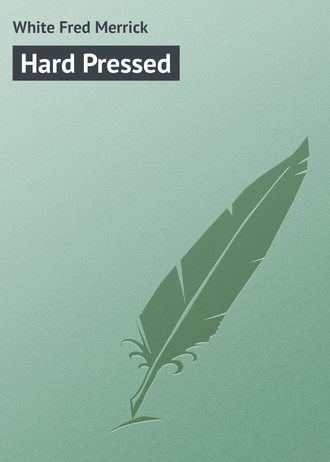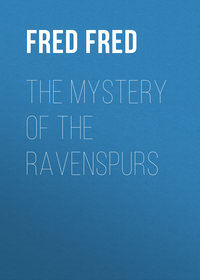 полная версия
полная версияHard Pressed
"Oh, give him money and let him have his way," Copley cried impatiently. "There isn't much chance of drumming sense into him to-night."
A whispered conversation between Copley and Foster followed, then three sovereigns changed hands and Chaffey departed along the road with the air of a man who has an object in life.
"You have done the right thing," he said. "I knew you would, when you came to think of it, and I'll let Mr. Copley know all about the trial. Good-night, gentlemen, and good luck to you."
So Chaffey vanished into the darkness.
CHAPTER XXVI
A SECOND TRIAL
DESPITE his cheery optimism, Joe Raffle did not appear so gay as usual. He seemed to have something on his mind, and those under him noticed that now and then he spoke with a sharpness that was not customary. In fact, the groom was troubled. He had been glad to see his old master again and to know that his small conspiracy looked like setting Harry Fielden on his feet once more. But when he came to review the position of affairs he did not feel absolutely satisfied, though he had done nobody a wrong, nor had calculated on putting a single penny in his pocket. On the contrary, he had been convinced that he was doing a most disinterested action.
But in the light of the past few days everything looked different. Raffle was by no means blind to what was going on around him. There was plenty of gossip in the stables, for some degree of friendship between the lads at Haredale Park and those at Seton Manor was inevitable, and it was an open secret that there might possibly be an alliance between the two houses. It was plain to Raffle's keen eyes that May Haredale disliked Raymond Copley intensely and that Sir George was doing all he could to remove this objection. Raffle guessed, too, pretty accurately what was the state of Harry Fielden's feelings, and saw that if this marriage took place his little scheme would be worse than useless. If Fielden had not turned up again it would not have mattered. But as it was the large fortune which Sir George was about to annex seemed likely to go into the pockets of Raymond Copley.
Joe hated Raymond Copley with all the contempt that an old sportsman has for an ignorant dabbler in the great game. He knew that Copley cared nothing for racing for its own sake, that he kept his stable only to give himself importance in the eyes of his neighbours. Raffle was not aware that the Seton Manor stud was a blind to cover the conspiracies hatched between Copley and Foster, but he knew enough to set his teeth on edge and to make him determined to stop this hateful marriage if he could. It was gall and wormwood to feel that after all he had been working and planning for the advantage of Copley. He knew that Harry Fielden would have some delicacy in interfering and believed it likely that, if May consented to become Copley's wife, he would forbid Raffle to say a word about the real ownership of the Blenheim colt.
This was bad, but worse was to follow. For the last two or three days the colt had been off his feed, and Raffle thought he was developing symptoms of staleness. To settle this point, he arranged for another early morning trial. He had confided his intention to a couple of his trusty helpers, who fondly imagined that no one knew of it but themselves. But these things leak out in stables, and in some mysterious way the projected trial reached the ears of Chaffey, who, when he chose to tear himself away from his beloved bars, was one of the cleverest touts that ever worried a stable. After parting from Copley and Foster, he staggered along cheerfully till he came to a roadside public-house, where he obtained a shakedown for the night. The thirst for drink was upon him – indeed, it was seldom or never absent – but he managed to put a check upon himself, and retired to bed with strict injunctions to be called at daybreak. In the morning he rose a trembling wreck, his tongue cleaved to the roof of his mouth, his nerves were a-quiver, but, by a supreme effort, he kept himself from the drink which called to him so strongly. The smell of it in the dingy public-house appealed to him mockingly, but he thrust the fierce desire aside and stole off to the Downs with splitting head and aching brows. He resolved to make up for his sufferings later. With luck he would be in London soon after nine o'clock. An hour later he would have sold his valuable information, and then – well, then, he would enjoy himself after the manner of his kind.
Having concealed himself in a patch of gorse, he waited with what patience he could for the trial. It was a long and weary vigil, but presently he heard the muffled tramp of horses and the sound of voices. Cautiously Chaffey raised himself and peeped out. He knew he was hiding just behind the winning-post. The solitary figure standing there was familiar to him. With a grin he recognized Fielden.
In the distance he could see two horses flashing along, and as they drew nearer he made out the fine dashing outline of the Blenheim colt. He had never seen that noble animal before, but his keen instinct told him he was not mistaken. He forgot his aches, pains, and everything else in the excitement of the moment. He saw the Blenheim colt holding his own, sailing along with a free and easy stride, and then suddenly, within a hundred yards or so of the gorse bushes, the other horse came away and finished many lengths ahead. The colt had a peculiar action that Chaffey did not fail to notice.
"They are right," he said, "the colt's queer. My word! it was well I came here this morning. This will be five and twenty pounds in my pocket. And if I have any luck that bloomin' Copley can get somebody else to look after his fruit baskets. I've had enough of it."
Chaffey dropped down as he saw Raffle coming up to the winning-post. The horses had been led away, and nobody could hear what Fielden and his companion and Mallow had to say.
"This is a bad business," Harry observed.
"Looks like it, sir," Raffle said gloomily. "I can't make out what's wrong with the colt. I thought I knew all about horses, but this puzzles me. He seemed quite right a day or two ago, and I can't see now what's wrong."
"Oh, there's plenty of time," Fielden said cheerfully. "I daresay you'll manage to make him fit for the Guineas. It is a good thing I didn't take your advice and back him. I am glad the money I got for the library is still in the bank."
The stud-groom shook his head obstinately.
"I don't think you are right, sir," he said. "I still believe in the colt and, as you say, there is heaps of time between now and the Guineas. Of course, I must tell Sir George, and a fine state he'll be in, I expect. Just think what a difference that colt will make if he wins. And yet you refuse, sir, to benefit by so much as a penny."
"Why should I?" Fielden asked. "Practically the horse doesn't belong to me. Legally, I suppose, he does, and I have no doubt I could put in a successful claim. But the colt was only a yearling when I went away. He has been trained in Mallow's stable and by Sir George's man."
"I never call myself that, sir," Raffle muttered.
"Ah, but you are, Joe, morally speaking. You have accepted service under him, and you take his money. I know you have behaved exceedingly well to me. I know you have meant everything for the best, and I thank you for it. But I cannot interfere. Can't you see that I am in honour bound – "
"In honour bound to stand by and see Mr. Copley marry Miss Haredale?" Raffle asked indignantly. "I am sure I beg your pardon. I forgot myself. I had no business to speak like that to you. But that is what it is coming to. Here have I been working and scheming and keeping my mouth shut to put a matter of a hundred thousand pounds into Mr. Copley's pockets."
"If the colt wins," Fielden suggested.
"Oh, he'll be all right, sir. It is only a matter of a few days, but if this thing gets talked about, why, the colt will go bang down in the betting and we shall all make fortunes with the outlay of a few pounds. There is another thing I must tell you. You see, it is like this – "
Raffle turned away as he spoke, and Fielden followed him, so that the figure eagerly listening behind the gorse bush could hear no more. Though, on the whole, he had had an exceedingly fortunate morning, he bitterly regretted that the deeply-interesting conversation had been cut short just at the point when he might have picked up information that might have made his fortune.
"I wonder what they're talking about?" he muttered, as he limped painfully and slowly across the Downs towards Seton Manor. "I suppose I had better give Mr. Copley a tip. I can send it to him from one of these pubs. He doesn't deserve any consideration from me, but it will be worth a fiver later. Now for breakfast and just one drink – only one before I get back to London and draw my money. There will be plenty of time for fun this evening. What a fool I've been! If I could only have kept off that accursed liquor I should have had a stud of my own by this time."
With this philosophy on his lips Chaffey turned into the bar of the nearest public-house.
CHAPTER XXVII
DRIVING IT HOME
COPLEY sat at the breakfast-table waiting for Foster to come down. He had glanced impatiently through his letters, none of which appeared to be particularly interesting. Then he picked up a repulsive-looking envelope that lay by the side of his plate. The envelope was greasy and forbidding, though the handwriting upon it was fairly neat and clear, if a trifle unsteady. Copley was on the point of pitching it into the fire, feeling pretty sure it was something in the nature of a begging epistle, when he changed his mind and opened it.
"Dear sir," it ran, "I was on the Downs this morning and saw the trial I was speaking to you about last night. Sir George's head man thought it a dead secret, but I had had it from a sure quarter, and I saw the race between the Blenheim colt and another at half-past seven. The colt was quite stale, and, if I am any judge of such matters, I think it will take all their time to wind him up for the Guineas. I thought you would like to know this, because, properly handled, there is money in it. Perhaps it may be worth a five-pound note to me the next time we meet."
There was no signature to this document, but Copley guessed where it came from. He rose from the table and stood for a while thinking this over. There was money in the tidings, but not in the way hinted at by Chaffey.
"Anything fresh?" Foster asked, as he attacked his breakfast with zest. "You look rather pleased about something."
"Well, I am," Copley said, with a sinister smile he found it hard to conceal. "I've got something here that looks like good business if we can only hold on a bit longer. As you know, we don't quite agree as to how Sir George Haredale is to be handled. If I went to him boldly and told him that he must scratch the Blenheim colt, do you think he would consent if he saw I was in earnest? My opinion is he would kick me out of the house. But there is another way of working it, and for the hint I have to thank Chaffey, of all people in the world. Here is a note from him."
"Wants more money," Foster said with his mouth full.
"Not for the moment, at any rate. He thinks his information is worth a prospective fiver. As a matter of fact, it is invaluable. You know he told us last night that he wasn't going away till he witnessed a trial this morning. He has seen it, and this letter gives me the result. The trial was that of the Blenheim colt. Chaffey says it will take them all their time to get him fit for the Guineas, even if they can manage it. Chaffey is probably in town by now, and has no doubt sold his information to some smart bookmaker. By this time to-morrow the Blenheim colt will be knocked out of the betting, and one will be able to get any price one likes. When this becomes public property Sir George will be justified in scratching the colt. He could say he had no hopes now of winning the Derby, and has taken this step solely on behalf of the public. Everybody will believe him. No questions will be asked, and his conduct will be regarded as most sportsmanlike. Do you see what I am driving at?"
"By Jove!" Foster exclaimed. "That is really smart of you. As Sir George backed his colt at long prices the money loss will be small. You can arrange as to the money Sir George owes you, and directly the pen is put through the colt's name we shall be masters of a hundred thousand pounds. It isn't so much as we expected, but we shall be able to draw the money during the next few days, and then be in a position to carry on a war against the bookmakers till we have made as much as we like. Things are entirely in your hands. You have only to put it plainly to Sir George and offer to cancel his mortgages, and the thing is done. He'll fall in with your suggestion readily. He only wants the excuse to get out. You'll want to handle him carefully, of course. But every man has his price, and I don't believe Haredale is any exception to the rule."
"I'll do it to-day," Copley muttered.
"That's right," Foster said approvingly, "there's nothing like striking while the iron is hot. But if I were you I'd run up to town first and give Absalom & Co. a hint to put the screw on without delay. What you have to do is thoroughly to frighten Sir George, who will probably send for you, and see if he can't arrange terms. We had better motor to London at once. It might be as well to get Absalom's people to send a man down this afternoon to let Sir George know that business is meant. By the time we get back this evening there will be a note from Sir George asking you to go over and see him. If not, I am no prophet."
On the best of terms with themselves the conspirators started for town half an hour later, and before eleven o'clock Copley was closeted with the principal of the well-known financial house of Absalom & Co. Apparently the interview was to his satisfaction, for he soon made his way to the Post Club. Foster joined him at lunch, and up to four o'clock they amused themselves by making small wagers on the day's racing. Soon after five one of the waiters came into the smoking-room and informed Copley that a gentleman was waiting to see him.
He went downstairs to find Mr. Absalom in the ante-room. The latter smiled as he heard the clicking of the machines.
"Do you do anything in that way?" Copley asked.
"Not I," the visitor laughed. "I leave that to the fools who have more money than sense. If there were no such thing as a horse or a bet I should be deprived of nine-tenths of my clients, and instead of being a rich man, I should be hard put to it to obtain a living. So the sport has all my sympathy. But I didn't come here to discuss racing. I want to speak to you about Sir George Haredale. I sent my manager down to see him."
"Yes, yes," Copley said impatiently.
"Oh, I won't detain you longer than I can help. My manager saw Sir George and had a long conversation with him. He was inclined to be high and mighty at first, but we soon changed all that. He was very anxious to know why you had transferred your debt to us, and we told him, of course, that you were engaged in very big speculations which called for all the ready capital you could lay your hands upon. We also hinted that we were finding money tight, and gave him to know that unless the cash was paid within a week, we should have to avail ourselves of our rights and place a man in possession at Haredale Park. That rather knocked the old gentleman off his balance. My manager said he was quite civil after that, and intimated his intention to do everything he could. But, at the same time, he appears to be very much annoyed with you. He thinks you have not treated him fairly, and seems to hope that when he has seen you he can arrange matters. Of course, he hasn't the least idea that we are merely dummies, so if you change your mind you can telephone to us and we will sit tight. He said he expected to see you this evening."
Copley nodded approvingly. There was no need for hurry, for he knew that the longer Sir George Haredale thought over the matter, the more likely he was to yield in the end. After thanking Absalom, who went his way, he sent for Foster.
"It's all right," he said when the latter came downstairs. "Absalom's people have seen Sir George, and have left him in a state of blue funk. I think the best thing we can do is to let him think it over for a day or two, because the longer he dwells upon the prospect before him the more likely he will be to listen to any terms I choose to offer. But we can talk this over after dinner. Let's get back to Seton Manor. By the way, I suppose you have dealt with those commissions. Did you manage to lay any money against the Blenheim colt to advantage? Has the trial leaked out yet?"
"I managed to get a good lump on," Foster explained. "I fancy the story is getting known. According to one of the papers, the Blenheim colt has gone back to six to one. I think we have done as much as we can. At any rate, the money is as good as in our pockets."
At Seton Manor Copley and his accomplice sat down to dinner in higher spirits and with better appetite than they had displayed for some time. There was nothing to trouble them. They had netted a huge sum of money without the slightest risk, and, what was more to the point, they would be in a position to handle it in the course of a few days. There was a good deal of flavour in Copley's cigar as he lay back in his seat sipping his coffee. A moment or two later a footman came in with a note on a tray. Copley smiled as he tore open the envelope, and intimated to the servant that he need not wait.
"From the Baronet?" Foster grinned.
"You've guessed it," Copley replied. "He wants me to go over at once on most important business."
CHAPTER XXVIII
HONOUR BRIGHT
AS time passed Sir George Haredale began to think that trouble was really before him. He had not the least pretence to be a business man. He had always been prone to take people at their own valuation. He would never have done anything dishonest or underhanded, and he paid his fellow-men a similar compliment. He had never counted the cost of anything, for the simple reason that he had never been taught to. If he wanted a thing he got it. If he couldn't pay for anything he simply owed for it. When, from time to time, his creditors grew pressing, he gave his lawyers instructions to raise another mortgage, and there, so far as he was concerned, was an end of the whole transaction.
It does not take long, especially with two or three generations of similar incapacity, seriously to embarrass even so fine an estate as Haredale Park. The day came at length when Sir George was under the painful necessity of facing the inevitable, when his worried lawyer told him a few plain truths, and he realized that his income was barely sufficient to live upon. Unfortunately, at this crisis, an occasional run of luck on the turf had relieved the pressure, and it occurred to Sir George as a brilliant idea that here was a source of permanent income. Then luck ran steadily against him, as it always does sooner or later, and at the time Sir George made the acquaintance of Copley he was literally at his wits' end to know what to do.
It was a misfortune, though a disguised one, that Copley in his headstrong way should fall in love with May Haredale. He had gone about his wooing in characteristic fashion, and had recognized that, unless he were in a position to force the pace, his suit was hopeless. Hence he had helped Sir George, although he needed every penny he had for himself. At that time Copley did not see his way to get it all back and a great deal more. But now he had the consolation of knowing that he would come out all right, whether May Haredale became his wife or not.
He was playing his game with wonted caution and cunning. In response to Sir George's note, he pleaded some excuse, and on one pretext or other kept clear of Haredale Park for the best part of a week. He knew how to play his fish. He knew that delay was in his favour, and was not going to spoil his triumph by undue haste.
Sir George was thoroughly frightened. The interview with Messrs. Absalom's manager came in the light of a revelation to him. He realized that he was in Copley's power, and that the latter could ruin him whenever he chose. Not that he expected anything of the kind. He was of far too sanguine a nature for that, and being a gentleman and a man of honour he naturally believed the story that Copley was temporarily hard put to it for the want of money. From that point of view, of course, Copley was behaving very well. He had not pressed Sir George, nor had he insisted that the money must be paid. In point of fact, he had not mentioned the matter at all.
But Messrs. Absalom's manager had been emphatic enough. There was something in his manner which Sir George did not like. He actually had no respect for the aristocracy, and spoke as if money were the only thing in the world that mattered.
"It comes to this, Sir George," he said. "We must ask you to make arrangements to clear this off in a week. It is business, pure and simple, and my people want the money. Things are not going well, and we must look to you to settle this claim."
"Within a week?" Sir George cried. "Impossible!"
The shrewd manager shrugged his shoulders.
"I am sorry to hear you say that, Sir George," he replied. "In that case, we must take matters into our own hands and sell you up, including your horses in training. We shall much regret this step, but necessity will compel us. The best thing you can do is to consult your solicitors and see if you can raise a loan. Otherwise – well, I think I have made myself plain."
The man withdrew, leaving Sir George to his own disturbed thoughts. With his sanguine disposition and lack of business knowledge he still clung to the idea that Copley would be able to put this matter right. But when Copley wrote that business called him elsewhere Sir George's vague sense of alarm began to develop into a perfect nightmare. At the expiration of a week the first blow fell. A man, shabbily dressed and dingy of aspect, called to see Sir George and would take no refusal. He stood in the hall grimly quiet, waiting for the master of the house, who appeared presently and demanded in his haughtiest manner what the intruder wanted.
"I am here on behalf of Absalom & Co.," the intruder said. "Fact is, I represent the sheriff. It is no use blaming me, Sir George. I am only doing my duty, and it's not so pleasant, at that. But I am here in possession, and here I am bound by law to stay until this money is paid. As soon as that is done I shall be only too pleased to go away."
Sir George began to understand the position. He had heard of these things before, but they had always appeared to be remote enough from him. This was what was called an execution, and Sir George's dignity disappeared accordingly.
"This is very awkward," he said. "I had not anticipated anything like this. How long will you have to stay here?"
"Well, it varies according to circumstances," the man explained. "It all depends upon what action the plaintiffs take. If they give you an extension of time I may be here for a month. Sometimes I have been in a house much longer."
"A month," Sir George exclaimed, "impossible!"
"It may be less than that," the man said. "If they don't give you any time at all I shall be gone in a week. In the ordinary course of things, at the expiration of seven days the sheriff will come in and sell everything."
"Seven days!" Sir George repeated the words over and over again, as if he were trying to grasp their meaning. He had barely a week to find this money, and, if it were not forthcoming, everything he had would be disposed of. He would have to face the world without a penny. He wondered if these people would take his horses. He wondered whether their action would injure him in the Derby. But misfortunes never came singly, and it was possible that the Blenheim colt might not start for the historic race at all. For the moment everything lay in the hands of Raymond Copley. Probably he had not the slightest idea that Absalom & Co. had gone to these lengths. No doubt he would devise a way out of this disgraceful situation. It was the only chance.
"If you wouldn't mind going away," Sir George said, "and coming back later in the day, I will see what I can do."






